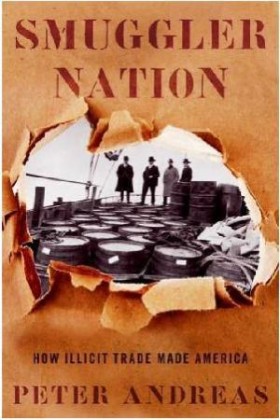Smuggler Nation: How Illicit Trade Made America, by Peter Andreas (2013, Oxford University Press, 454 pp., $22.41 HB Amazon)
Wow. With Smuggler Nation, Brown University political science professor Peter Andreas has hit the ball out of the park — or over the border. This book should be required reading not only for people interested in how we got to our current mess in the war on drugs, but also for anyone interested in American history in general, and the twinned growth of illicit commerce and the ever-increasing policing resources designed to thwart it in particular.
 What makes Smuggler Nation so essential for people primarily interested in drug policy is the manner in which it situates drug prohibition and efforts to suppress the drug trade within the larger historical context of state efforts to control — or prohibit — trade. The war on drugs (or at least its interdiction component) didn’t drop on us out of the sky, but was built upon already existing national-level efforts to enforce proscriptions on free trade, dating back to Jefferson’s abortive ban on US ships trading with any foreign nations, the more successful, but still long-lasting and highly contentious effort to ban the slave trade, and Prohibition-era border enforcement.
What makes Smuggler Nation so essential for people primarily interested in drug policy is the manner in which it situates drug prohibition and efforts to suppress the drug trade within the larger historical context of state efforts to control — or prohibit — trade. The war on drugs (or at least its interdiction component) didn’t drop on us out of the sky, but was built upon already existing national-level efforts to enforce proscriptions on free trade, dating back to Jefferson’s abortive ban on US ships trading with any foreign nations, the more successful, but still long-lasting and highly contentious effort to ban the slave trade, and Prohibition-era border enforcement.
Andreas shows that, going back to colonial times, smuggling and illicit commerce played a crucial role in the creation and expansion of the American economy, and, indeed, in the anti-British sentiment that led the way to the American Revolution in the first place. Whether it was enriching Providence and Boston merchants in the triangular slave trade, stealing intellectual property from England at the start of the Industrial Age, selling American cattle to hungry British troops stationed in Canada during the War of 1812, allying with the smuggler-pirate Jean Lafitte in the Battle of New Orleans in that same war, selling contraband whiskey to Indians, smuggling guns into Mexico (in the 1840s, in addition to now) — the list goes on and on — smuggling and illicit commerce was, and continues to be, part and parcel of the American story.
Andreas also show that those efforts to control unsanctioned commerce led directly — and continue to lead directly — to ever larger, more expansive, more expensive, and more unintended consequence-generating law enforcement efforts to suppress it. We saw it with the early growth of the US Navy to combat tax evading smugglers, and how those efforts rerouted, but did not defeat, illicit trade. We saw it with the expansion of drug war interdiction efforts in the 1980s, where blockading the Caribbean route for Colombian cocaine rerouted, but did not defeat, illicit trade, and helped provoke the metastasis of what had been largely low-key, local Mexican smuggling networks into the Frankenstein monster drug cartels of today.
We can see that at work today in the current debate over the immigration reform bill working its way through Congress. House Majority Leader Boehner thought he could sell the bill to his conservative caucus by agreeing to expansive provisions to “regain control of the border” or “secure the border” by spending billions of dollars and adding 20,000 more federal agents along the Mexican border. (Nevermind that even that’s not likely to be enough to satisfy Boehner’s caucus, some of whom might support the bill but others of which have charmingly compared Mexican immigrants to dogs and asserted that those DREAM Act kids are mostly drug mules.)
There were 3,000 border agents in the early 1990s, 7,000 by the late 1990s, and there are 20,000 right now. The immigration bill would double that number again. As Andreas, relying on the historical record, notes, that is unlikely to stop drug smuggling or people-smuggling (there are much deeper driving forces to such phenomenon than law enforcement), but merely to divert it or reroute it, to corrupt enforcers, and to inspire the smugglers to come up with new technologies to get around it and gain entrée into Fortress America.
Andreas also makes an important point about “the threat” of transnational organized crime. That’s pretty much just a fancy way of saying smuggling, he asserts, and it is nothing new. As he shows throughout Smuggler Nation, trade in contraband has been part of global trade since, well, forever. And now, given the rapid expansion of global commerce in recent decades, it would be surprising if contraband trade isn’t expanding, too. It is, he argues, but possibly at a slower rate than the expansion of licit global trade. All of the hulaballoo over “the menace” of illicit trade is overdone, he dares to suggest.
Andreas is an academic who specialized in the US-Mexico border in his early career, and his publisher, Oxford University Press, is an academic press, but his writing is quite accessible to the lay reader. Smuggler Nation is chock full of great lost stories from American history, stories that hold serious lessons for us today as we struggle against the behemoth that our prohibition industry has become. Smuggler Nation will help explain how we got here, and you’ll learn plenty and have lots of fun along the way. This book needs to be on your bookshelf, and well-worn at that.
Article republished from Stop the Drug War under Creative Commons Licensing









